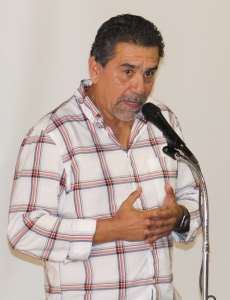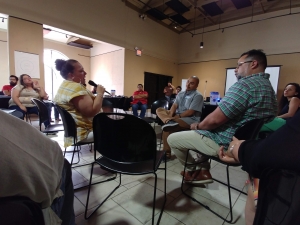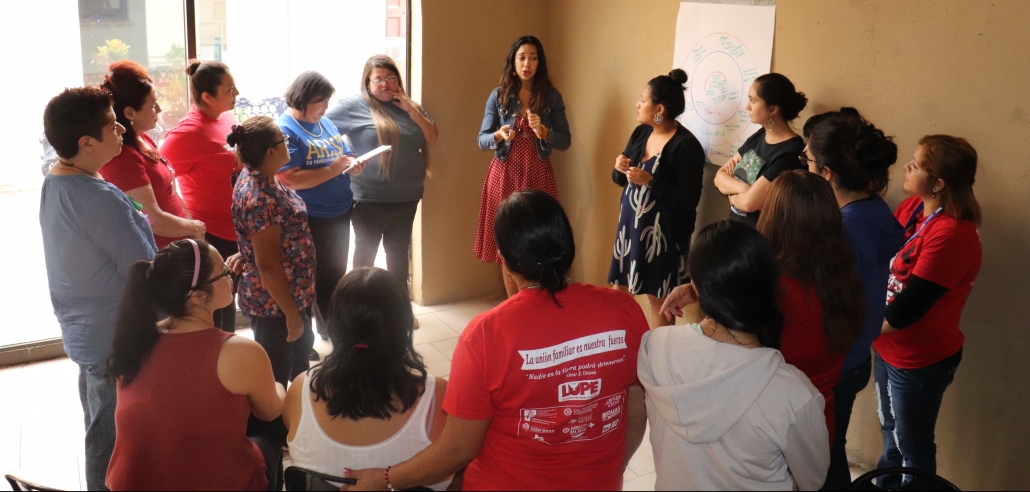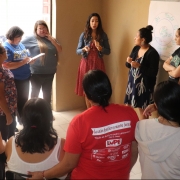By UCLA Latino Policy & Politics Initiative (LPPI)
In their 5th Annual Latinx Criminal Justice Convening, LatinoJustice PRLDEF partnered with Rio Grande Valley Equal Voice Network brought local and national organizations to Brownsville, TX to engage in conversation about Latinos in the criminal justice and immigration systems.
This two-day encuentro was intended to create a space for Latino leaders, activists, academics and impacted community members to explore the connection to the criminal justice and immigration systems across the United States while strategizing new efforts for a more inclusive movement that does not leave anyone behind.

Latino Justice PRLEF’s Jorge Renaud welcoming attendees and introducing the convening and its goals.
“It’s important to be collaborating [and to] bring that intersectionality in this space,” said Christina Patiño Houel, Network Weaver for RGV Equal Voice Network. Intersectionality and inclusivity were interwoven throughout the convening, being cognizant of the ways different structural oppressions work in tandem to affect the most vulnerable in our communities, in order to combat these injustices effectively. An example was how interpreters established a multilingual culture, ensuring Spanish and English-only speakers communicated smoothly with each other, as the organizers understood that language barriers hinder those trying to combat the injustices within the justice system and also understood that interpretation and translation were necessary since the event was a community-centered multi-generational convening. This emphasis was also felt when formerly-incarcerated individuals were welcomed home for the first time, integrating a healing component for all participants.
The discussions began by exploring how criminality, incarceration, immigration and the war on drugs have all played a role in the current relationship between the Latinx community and the criminal justice system. The lack of data on this community was highlighted by LatinoJustice PRLDEF’s president, Juan Cartagena, when he discussed how every system “affects us and we don’t even know how… we’re invisible.” He explained how even as the largest ethnic minority in the country, the system could not answer simple questions as to how many Latinxs are arrested. This point was underscored by Dr. Edward Vargas’, from Arizona State University, urgency for not only the need for data but accurate data. For example, polls said that 34% of Latinos had voted for Trump in Texas, but this number was proven to be wrong. When the precinct data was scraped, the actual number was 16%.

ACLU’s National Campaign Strategist, Jessica Sandoval; Texas Criminal Justice Coalition’s Policy Analyst Jose Flores; and Youth Justice Coalition’s Anthony Robles talking speaking on the best strategies to end youth solitary confinement.
Community members highlighted their work on the ground to end collaboration between the state and local police departments with U.S. Immigration and Customs Enforcement in the states of Texas and Georgia, jail closure and the prevention of a new jail in Los Angeles, and litigation. Crimmigration was the focal point of these conversations, where attorneys explained the importance of litigation and the need for patience in both the length of the process and the lack of social justice lawyers.
The conversation zeroed in on experts as they engaged in fishbowl conversations, discussing the development of gang databases and its impact on the immigrant community, the fight towards ending youth solitary, and the impact of these efforts on a national level.
Day one came to a close with the screening of Bad Hombres: From Colonization to Criminalization by award-winning filmmaker Carlos Sandoval, with attendees expressing their impressions to the documentary.
The second day was reserved for breakout sessions encouraging collaboration and the exchange of best practices in order to advance efforts and find resources in the community. Accountability partners were found and followed-up conversations were scheduled to further collaborate as a group.
“Learning more about crimmigration and its impact on the Latinx community has been eye-opening,” noted second-year UCLA Luskin student María Morales who attended the convening. “It was an honor being able to attend this convening and feel such passion and dedication in the room.”

Attendees identifying action steps to continue collaboration among the organizations present.


